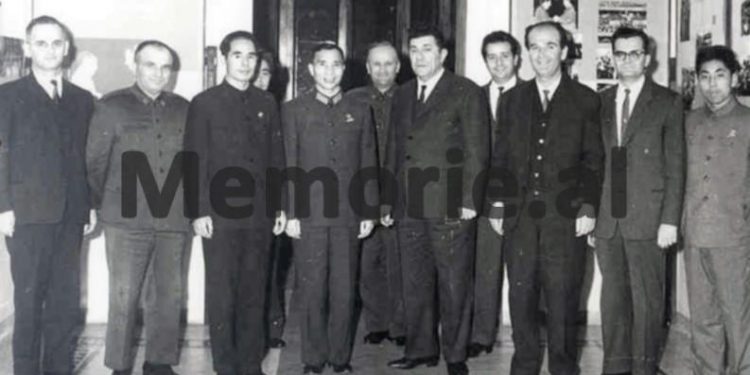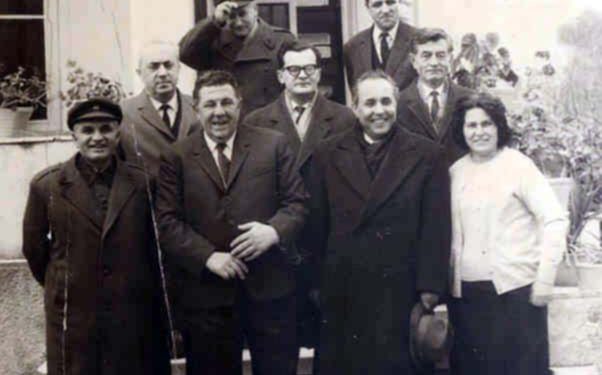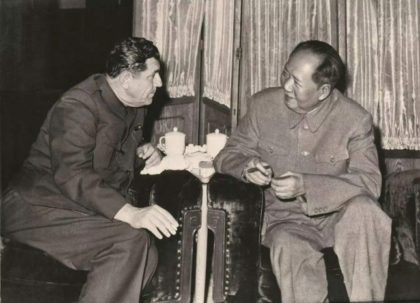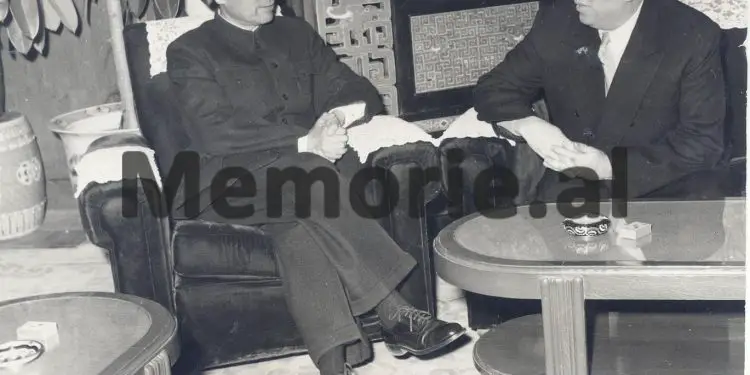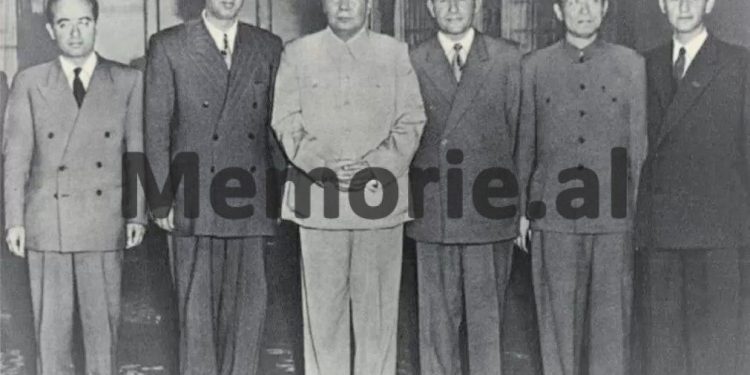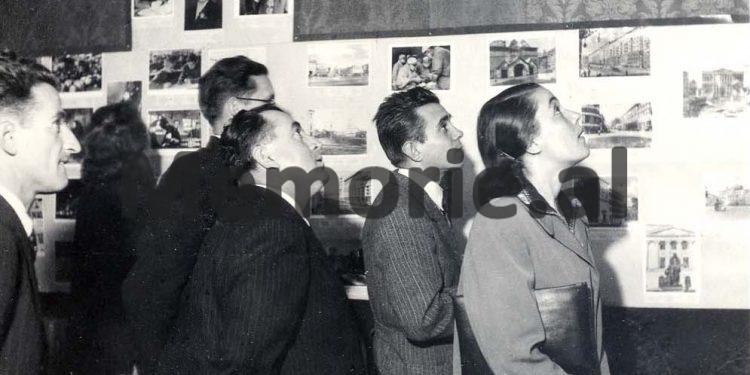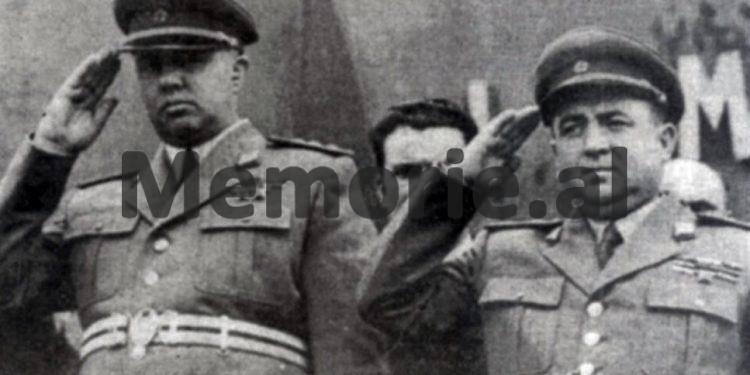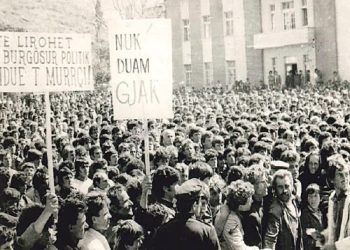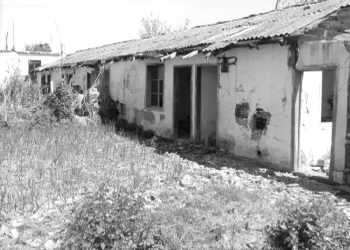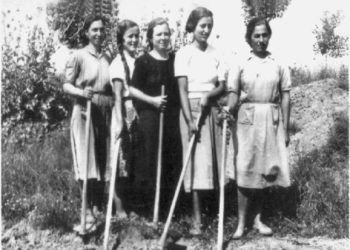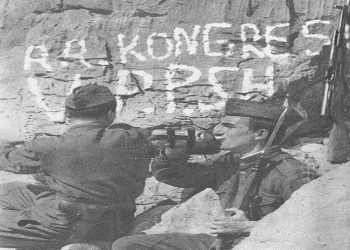Dashnor Kaloçi
Second part
Memorie.al publishes some archival documents extracted from the Central State Archive in Tirana (the fund of the former Central Committee of the ALP and the personal fund of Enver Hoxha), which contains the political diary of Enver Hoxha that he kept in the period October December 1972, when a large military delegation of the Ministry of Defense headed by Minister Beqir Balluku (attended by all directors of directorates and chiefs of all types of weapons), left for the People’s Republic of China, where according to orders given by Enver himself before the departure, they would ask the senior Chinese leadership to help the Albanian army, equipping it with combat equipment, as the Albanian army still had in use, World War II weapons, which had been given to them by the Soviet Union since 1955. The complete diary of Enver Hoxha regarding the military delegation headed by Minister Balluku, starting from their talks with Prime Minister Chu En Lai and leader other senior party and state figures of the People’s Republic of China, where he after expressing his reservations and dissatisfaction to China’s top leaders, starting with Mao Zedong, Chu En Lai, etc., accusing them of incompetence in the leadership of the party and the whole country, casts doubt on the physical elimination of the Minister of People’s Defense of China, Lin Biao, considering untrue the accusations of Chu En Lai, who told the Albanian delegation that Lin Biao had brought major damage to the Communist Party of China and the Chinese government. Enver Hoxha’s dissatisfaction with the Minister of Defense, Beqir Balluku, who would not return to Albania immediately, but had postponed the date of his return to Tirana for another two weeks, after he had decided to stay in Rome and Paris, with the whole delegation that accompanied him!
Enver Hoxha’s political diary for the visit of the high military delegation headed by Beqir Balluku to the People’s Republic of China in October 1972, which was also received by Prime Minister Chu En Lai
TALKS WITH THE FRIENDS OF THE MILITARY DELEGATION THAT WILL GO TO THE PRINCE OF CHINA
Followed by the last number
Others have reason to think so, despite the fact that Chu En Lai does not fail to say that the Soviet Union and the United States of America are two alike. As for China’s policy toward the United States, Chu En Lai said almost nothing; may the apostates he left this matter in silence, knowing our views or that he did not want to reveal the “rapprochement relations” which may erupt after the “signing of the peace in Vietnam”. I think both of these reasons made Chu En Lain not talk about this point. This view is reinforced by Chu En Lai’s view of the prospect of war in Vietnam. He said the Soviet Union was helping Vietnam a little. This is true. But to help Vietnam a little means to weaken its defenses. Chu En Lai was of the opinion that the Soviet Union wants the war in Vietnam to continue. There is a contradiction here, which lies in “on the one hand not to help the Vietnamese, and, on the other hand, to demand that the war continue”!
The Soviets may want the Vietnam War to continue, the United States to be kept in touch with this war, to prevent China from strengthening “friendship with the United States,” so that it continues to have no diplomatic relations with him. and not to “resolve” the Taiwan issue and the “stay” of the 7th US Fleet in Chinese waters. All these plans are made by the Soviets, they are interested in these, but such a thing does not correspond much to what they are doing, by not helping Vietnam with weapons. Of course, the Soviets, in alliance with the Americans, have many variants of plans in their purse, which they update, connect and coordinate with all the world problems, where they have inserted their noses. Chu En Lai did not speak almost at all about the issues of Europe and the Middle East, and it happened, not that he does not have his thoughts on the big problems that are boiling there.
A policy that is not very interested in China for these areas continues, and in my opinion, this is a mistake, because the solution of the political-military problems in these countries has great consequences for the countries of Asia. It is here, in Europe and in the near and Middle East that both superpowers try to find the word, consolidate the alliance, and have free hands elsewhere, at least for a period of time. Doing a passive policy, as China is doing, in these moments and for these regions, is not a far-sighted policy, why, by acting in this way, you expect the “ally adversary” to come to you in the imaginary “agreements” that you have arranged at a time with him. This is what it means to “cut the shadow”, which is hypothetical with the imperialists, why, exactly, they also worked to “you, China, cut the shadow”, until “they fix their affairs” and, when have arranged these without headaches, – because “you, China does not hinder them in their way”, – then they will come “but with a knife in their teeth”.
The other issue that Chu En Lai raised during the conversation was the internal situation in China, the issue of Lin Biao’s group. He’s talked about this problem for a long time, although in general they are the same things that their ambassador officially told us. Chu En Lai characterized Lin Biao’s activity as one of the most dangerous in China. “Lin Biaoja and his comrades,” he said, “were among the most dangerous conspirators, but they were a small group of nine people.” Here is the first contradiction. Of course, the version of Chua is accepted, that they were conspirators, but that these 9 or 10 people, posed the greatest danger for China, this is strange, as well as the other contradiction. Lin Biaoja and his group sabotaged everything during the Cultural Revolution! These as enemies that they were, there is no doubt that they damaged, restrained, but that any damage, any non-realization, any small defect, to blame them, means to strengthen the dose. It is said that this small group, but very dangerous, sabotaged the industry, agriculture and its mechanisms, sabotaged the armaments of the army, etc., etc.
The question is: Where were the others, the good ones? According to Chu En Lait, every mistake in the path of diplomacy, in politics, in ideology, has been made by Lin Biao’s group. The question arises: Where were the good ones? Why did they not react? Lin Biao raised the cult of Mao and was the one who called Mao a “great Marxist-Leninist”, a “great leader”. Again the question arises: Where were the others, the good ones? Why not prevent these? According to Chu En Lait, Lin Biao was a man of the Soviets, but again according to Chu En Lait, he feared an imminent attack by them against China, until, without the knowledge of the Bureau and Mao, he ordered the airfields to be filled with scrap metal. , to prevent Soviet planes from landing, and to open dams and flood cities, to prevent Soviet landings. And so, in the minutes of Chu En Lait’s exhibition, he finds a series of events, connected and disconnected, all to prove that Lin Biao’s group was a dangerous group, traitor, saboteur, etc.
Chu En Lai goes so far as to say that “Lin Biaoja was removed as ill, but he was a simulator”! Lots of weird stuff for a person who “had reached a very high position”! Why not accept all that is now rolling around for Lin Biao, a man who was completely unknown to us? He did not even appear on stage, he had no activity and it was for what we do not know anything, only that he was supported by Mao, Çuja and others. He was supported by the whole Party. Yesterday all of them spoke brilliantly about him, today they all wear what they did, according to Çusa, even in the organization of plots (and not once) to kill Mao. Our remarks on this internal issue are numerous, because in this treatment of problems, as Chu En Lai did, and this is the official version spread throughout their party, there are great and numerous contradictions.
First, in this paving of the problems is forgotten all the hostile work of Liu Shao Chi and his large group, who had thrown everything in his hands, had eliminated Mao, and had made the party in that state, as, for to liquidate this situation, the Cultural Revolution had to erupt. Mao himself has said several times to our friends “it is still unknown who will win, us or them”! The Chinese comrades, as far as we know, have not made an in-depth Marxist-Leninist analysis of the hostile activity of Liu Shao Chia’s group, to discover the roots and sources of this activity. Propaganda has been written and made against him, but this has remained only propaganda.
The facts show that during the Cultural Revolution another more dangerous hostile group was born under the leadership, which was at the head of the Cultural Revolution. This group, which was in charge and had the task of purging the pro-Soviet enemies, Liun and his group, turns out to be pro-Soviet itself! The Cultural Revolution needed to take place, but were the directives that guided it clear? Yes and no. It seems as if the directives arise from a strange spontaneity, which caused distortions from the right and from the left. Lin Biao’s group was “ultra-leftist”. Much has been said and written about the Cultural Revolution, but no in-depth analysis has been made of it by Chinese comrades. The Cultural Revolution did China good, or bad?
The Chinese say he did them good, but how is it then explained that Lin Biaoja and his nine accomplices sabotaged everything? Such analyzes are not very serious. Lin Biaoja and C ° have sabotaged, but all that hostile activity of Liu Shao Chia what happened?! What about all the others that this group left behind in the party and in power did not continue the sabotage?! These are underestimated. The great upheavals of the working class were forgotten, even the sabotages, even the strikes on the people of the Cultural Revolution, it was forgotten that the party ceased all activity, it was even shattered so badly that it has not yet been organized. What about the mass organizations that were liquidated at all? Why? Because “they were not okay”. This great disorder has not harmed, has not restrained, has not sabotaged? These things should be analyzed, but not analyzed just by saying that all the bad things have been done by Lin Biaoja.
It has been said, and Chu En Lai goes on to say, that “the army has been and is the pillar.” Strange!! At the head of the army was Lin Biaoja and “he could not use the army for his purposes”, and he could sabotage everything, when Maoja and Çuja were at the head!! This is incomprehensible, or becomes understandable only by thinking that the Communist Party of China was not on the right path, did not think and act on the basis of Marxism-Leninism and on the basis of the Leninist norms of a truly revolutionary party. In fact, under the leadership of the Communist Party of China, they have led different groups with different tendencies. Mao was a philosopher, but, as it turned out, philosophy had little to do with practice, he was liberal, and in this respect he let others organize, direct, distort.
He paid little attention to the collegial method of leadership and let the groups act as if nothing were wrong. And the groups hit each other. Mao was not a foreigner and reacted to the attack of these groups, but it was the groups that operated under the flag of Mao and with this flag tried to eliminate Mao himself. So did Li ° Shao Chia of C °, so did Lin Biaoja of C °. What did Çu En Lai do? This constantly and in every circumstance has been shown to be very resilient, very pragmatic, a man gone with all, with the strongest as they are in power and against them when they fell. Every attitude of his, for and against, Çuja always associated with Mao’s ideas. So at any time, good or bad for him, he waved Mao’s flag at the beginning and end of every event. This showed that Chu En Lai, following like all of Mao’s ideas, acted in line with Liu Shao Chi and applied him to politics, ideology and economics in particular.
So it was with Lin Biao’s group, he held the same attitudes. When these two groups broke their necks, Chu En Lait’s neck stood up again. He is more of a diplomat than a Marxist, he maneuvers in every circumstance. Chu En Lai was needed by everyone, from Mao to Lin Biao, because he is a good man, a great organizer, a great economist, a talented diplomat and, at the same time, a perfect opportunist. In all these respects he is one of the most prominent personalities of China after Mao, I can even say even more qualified than Mao Zedong. These skills, not of the determined Marxist, it is fair to say that he has put them at the service of China, as he thinks, on a broad liberal platform. Characteristically, this senior leader of China shows that he has a great organizational ability for everything, but he does not put this talent in the service of the party. No, the party suffers from organization. Why?
Many assumptions can be made, but now, in this short article, I cannot go in and make assumptions, because we do not have enough facts and documents for this purpose. Chinese friends are very stingy in giving facts and documents. However, we will see how and to what extent the Communist Party of China and its leadership will learn from these sufferings, how valuable they will be and how they will be implemented to strengthen the situation in the party, in the state and for the good of socialism in China and in the world. We wish that everything there is fixed right, goes well. We may even make mistakes in these analyzes, but it is not Marxist-Leninist not to do them, not to think and to draw lessons for ourselves. We have been and are obliged to do our analysis on what our Chinese comrades tell us, which we believe in, but in a critical, and Marxist-Leninist spirit. Memorie.al




